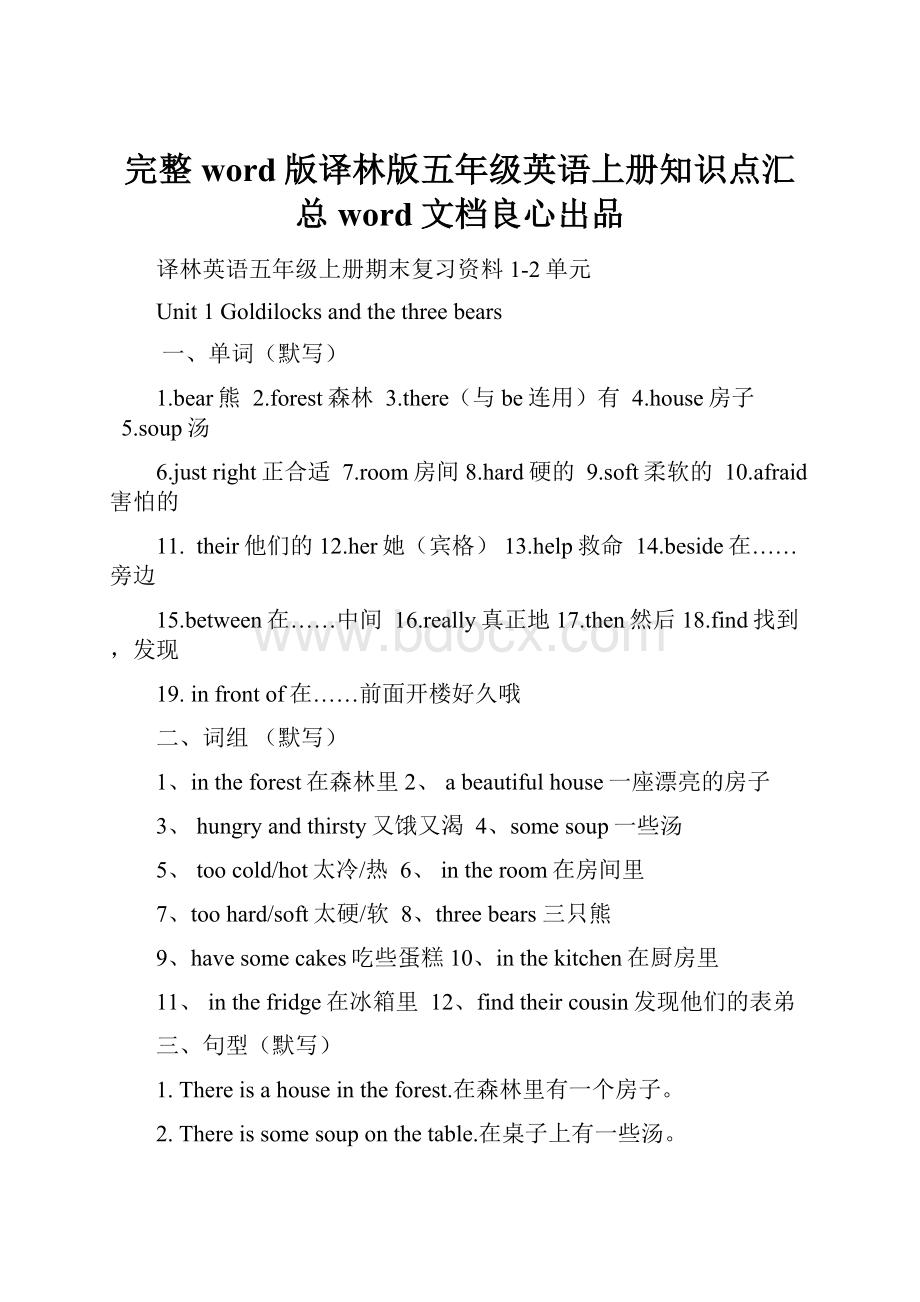完整word版译林版五年级英语上册知识点汇总word文档良心出品.docx
《完整word版译林版五年级英语上册知识点汇总word文档良心出品.docx》由会员分享,可在线阅读,更多相关《完整word版译林版五年级英语上册知识点汇总word文档良心出品.docx(18页珍藏版)》请在冰豆网上搜索。

完整word版译林版五年级英语上册知识点汇总word文档良心出品
译林英语五年级上册期末复习资料1-2单元
Unit1Goldilocks and the three bears
一、单词(默写)
1.bear熊 2.forest森林 3.there(与be连用)有 4.house房子 5.soup汤
6.just right正合适 7.room房间8.hard硬的 9.soft柔软的 10.afraid害怕的
11. their他们的12.her她(宾格)13.help救命 14.beside在……旁边
15.between在……中间 16.really真正地17.then然后 18.find找到,发现
19. in front of在……前面开楼好久哦
二、词组 (默写)
1、in the forest在森林里2、 a beautiful house一座漂亮的房子
3、 hungry and thirsty又饿又渴 4、some soup一些汤
5、 too cold/hot太冷/热 6、 in the room在房间里
7、too hard/soft太硬/软 8、three bears 三只熊
9、have some cakes吃些蛋糕10、in the kitchen在厨房里
11、 in the fridge在冰箱里 12、find their cousin发现他们的表弟
三、句型(默写)
1. There is a house in the forest.在森林里有一个房子。
2. There is some soup on the table.在桌子上有一些汤。
3. There are three bears in front of her.在她前面有三只熊。
4. This soup is too cold.这汤太冷了。
5. What a beautiful house!
多么漂亮的房子!
6. She is hungry and thirsty.她是又饿又渴。
7.Bobby cannot(can’t) see any cakes in the fridge. 波比看不到冰箱里有蛋糕。
四.语法点(理解)
1.There be句型表示“某处有某物”
(1)其中thereis用于单数名词或不可数名词,如:
There is a pencil case in the school bag. There is some soup/milk /tea/coffee/juice
/water/chocolate.
(2)Thereare用于可数名词的复数,如:
There are some desks in the classroom.
(3)Therebe句型的就近原则:
be动词后面如果跟的是不止一种物品,就根据离它最近的物品选用is或are.如:
There are some pictures and a telephone. There is a telephone and some pictures.
2.There be 句型的否定形式:
在be动词的后面加not(is not可以缩写为isn't,are not可以缩写为 aren't)把some 改成any。
例:
There is a pencil in the pencil-box.
(改为否定句) There isn't a pencil in the pencil-box.
There are some crayons on the desk.
(改为否定句) There aren't any crayons on the desk.
3.“some”和“any”都有“一些”的意思.“some”一般用于肯定句,“any”用于否定句和一般疑问句。
但在一些表示委婉请求,想得到对方肯定回答的疑问句中,也用“some”.
例:
1.There are some watermelons in the basket.(肯定句)
2.There aren't any birds in the tree.(否定句)
3.Are there any toy trains on the table?
(疑问句)
4.Would you like some tea?
(表委婉请求)
4.can在否定句中的用法:
表示某人不能做某事时,通常在can后面加否定词not,后面加动词原形。
Bobby cannot(can’t) see any cakes in the fridge.
5. 感叹句的结构:
感叹句常用how或what来引导
(1)what引导的感叹句
a.What+a/an+形容词+可数名词单数!
What a beautiful house!
b.What+形容词+可数名词复数!
What nice dresses!
c. What+形容词+不可数名词!
What delicious milk!
(2)how引导的感叹句 How+形容词/副词!
How nice!
Unit 2 A new student
一、单词(默写)
1.student学生2.classroom教室3.floor楼层puter电脑
5.first第一,首先6.second第二7.third第三8.playground操场9.swing秋千10.push推11.heavy重的12.stop停下13.high高的14.great很多的,极大的
二、词组(默写)
1.anewstudent一名新学生2.show……around带领……参观
3.howmanyclassrooms多少间教室4.inourschool在我们学校里
5.somecomputerrooms一些电脑室6.amusicroom一间音乐室
7.onthethirdfloor在三楼8.atabletennisroom一间乒乓球室
9.goandhavealook去看看10.singanddance又唱又跳
11.drinksomenicejuice喝些美味的果汁12.gotothecinema去电影院
13.haveaniceicecream吃一个美味的冰淇淋14.intheplayground在操场上
15.goandplay去玩一玩16.ontheswing在秋千上
17.soheavy真的重18.toohigh太高
19.greatfun很有趣20.playagain.再玩一次
21.gohome回家22.anartroom一间美术室
三、句型(默写)
1.Canyoushowheraround?
你能带领她参观吗?
2.Howmanyclassroomsarethereinourschool?
在我们学校有多少间教室?
3.Ourclassroomisonthesecondfloor.我们教室在二楼。
4.Arethereanycomputerrooms?
有一些电脑室吗?
5.Isthereamusicroom?
有电脑室吗?
6.Let’sgoandhavealook.让我们去看看。
四、语法点(理解)
1.Howmany...(可数名词复数)arethere...?
用于询问某处有多少...
例:
Howmanyclassroomsarethereinourschool?
2.Therebe的一般疑问句,是将be动词提前到there的前面,表示“有......?
”
(1)Isthere...?
Yes,thereis./No,thereisn’t.
例:
Isthereamusicroom?
(2)Arethereany...?
Yes,thereare./No,therearen’t.
例:
Arethereanybooks?
3.几个缩写isn’t=isnotaren’t=arenotit’s=itisthey’re=theyare
4.序数词
one-----firsttwo---secondthree----thirdfour---fourthfive---fifthsix---sixth
5.在楼层前用介词on,onthefirst/second/thirdfloor在一/二/三楼...
Unit3Ouranimalfriends
一、词汇
ouranimalfriends我们的动物朋友twofish两条鱼theother另一个
abigtail一条大尾巴bigbodies大身体haveno没有
fourlegs四条腿nicewings漂亮的翅膀redeyes红眼睛
longears长耳朵bigarms大手臂bigfeet大脚
itsbody它的身体yourfingers你的手指onthefarm在农场上
☆baldeagles白头秃鹰☆polarbears北极熊☆abigkangaroo一只袋鼠
☆inCanada在加拿大☆inAustralia在澳大利亚☆liketherain喜欢下雨
☆sunnyweather晴朗的天气☆comeout出来☆carryanumbrella拿一把雨伞
二、句型
1.Ihavetwoanimalfriends.我有两个动物朋友。
2.Oneisredandtheotherisblack.一个是红的另一个是黑的。
3.Theyhavebigeyesandbigbodies.它们有大眼睛和大身体。
4.Theyhavenolegsandarms.它们没有腿和手臂。
5.Ithasfourlegsandashorttail.他有四条腿和一条短尾巴。
6.Ithastwolegsandtwonicewings.它有两条腿和一双漂亮的翅膀。
7.Hehasadog.他有一只狗。
8.Shehasabird.她有一只鸟。
9.Itcantalkandfly.它既会说话又会飞。
10.Doyouhaveananimalfriend?
Yes,Ido.你有一个动物朋友吗?
是的,我有。
11.Doesithavealongtail?
Yes,itdoes.它有一条长尾巴吗?
是的,它有。
12.Doeshehaveaparrot?
No,hedoesn’t.他有一只鹦鹉嘛?
不,他没有。
13.Doesshehavetwofish?
No,shedoesn’t.她有两条鱼吗?
不,她没有。
14.Dotheyhaveanimalfriends?
No,theydon’t.他们有动物朋友吗?
不,他们没有。
15.Thosearenotlegs.那些不是腿。
16.Giveitacake.给它一个蛋糕。
三、语音
Uu/Λ/bus,duck,summer,sun,umbrella,mum,lunch,cup,rubber,run,but,much,jump,Sunday,subject,
4、语法
have/has的用法
1、表示某人有某物。
2、主语是第一、第二人称单数和复数时用have,如I,you,we,they,thestudents…
主语是第三人称单数时用has,如he,she,it,Helen,thebird,myfather…
3、肯定句:
…have/has…
WehaveaPElessononMondaymorning./Ithasalongtail.
否定句:
…don’t/doesn’t+have…
Theydon’thaveanimalfriends./Shedoesn’thaveadog.
一般疑问句:
Do/Does…have…Yes,…do/does.No,…don’t/don’t.
Doyouhaveafootball?
Yes,Ido./No,Idon’t.
Doeshehaveatoycar?
Yes,hedoes./No,hedoesn’t.
Unit4Hobbies
一、词汇
singanddance唱歌跳舞begoodat擅长于withmybrother和我弟弟
readstories读故事inthepark在公园里playthepiano弹钢琴
alotof许多watchfilms看电影talkabout谈论某事
myhobby我的爱好theirhobbies他们的爱好inwinter在冬天
verywell很好anidea一个主意agreatidea一个好主意
thisafternoon今天下午ontheice在冰上begoodatskating擅长溜冰
abighole一个大洞intheice在冰里coldandwet又冷又湿
likeclimbing喜欢爬山likeswimming喜欢游泳likedrawing喜欢画画
playbasketball打篮球playtabletennis打乒乓playfootball踢足球
二、句型
1.Whatdoyoulikedoing?
你喜欢干什么?
Ilikeplayingbasketballandfootball.我喜欢打篮球和踢足球。
2.Icanplaybasketballwell,butI’mnotgoodatfootball.我篮球打得很好,但我不擅长足球。
3.Helikesplayingfootballtoo.他也喜欢踢足球。
4.Shealsolikesplayingthepiano.她也喜欢弹钢琴。
5.Theybothlikeswimming.她们都喜欢游泳。
6.Whatdoeshelikedoing?
他喜欢干什么?
Helikesdrawing.他喜欢画画。
7.Whatdoesshelikedoing?
她喜欢干什么?
Shelikesreadingstories.她喜欢读故事。
8.Whatdotheylikedoing?
她们喜欢干什么?
Theylikewatchingfilms.她们喜欢看电影。
9.SamandBillytalkingabouttheirhobbies.山姆和比利谈论他们的爱好。
10.Let’sgoskatingthisafternoon.咱们今天下午去滑冰。
11.Lookout!
小心!
12.Thereisaholeintheice.冰里有一个洞。
13.Doyoulikewearingyellow?
你喜欢穿黄色的衣服?
14.Wealllikeclimbingverymuch.我们都十分喜欢爬山。
三、语音
Yy/j/year,yes,yellow,you,young
四、语法
1.询问别人喜欢干某事,Whatdo/does…likedoing?
喜欢干某事likedoingsth,doing表示喜欢经常做一件事。
主语是第三人称单数时注意like后面加s.
不喜欢干某事don’t/doesn’tlikedoingsth
2.动名词的变化规律:
a.一般情况下在动词后面加ing.如going,reading,drawing,playing…
b.以不发音的字母e结尾的动词,去e再加ing.如dancing,making…
c.以“元音+辅音”结尾的重读闭音节单词,先双写辅音字母再加ing.如swimming,running,getting,putting…
Unit5 What do they do
【单词】
1.teacher老师2.teach教3.writer作家4.write写5.work工作
6.athome在家7.doctor医生8.help帮助9.sick生病10.people人,人们11.factory工厂12.worker工人13.cook厨师14.driver驾驶员,司机
15.farmer农民16.nurse护士17.policeman警察
【词组】
1.teachEnglish教英语2.alotofstudents=lotsofstudents许多学生
3.Whatabout...?
=Howabout....?
....怎么样4.anEnglishteacher一位英语教师
5.writestories写故事6.workathome在家工作
7.helpsickpeople帮助生病的人8.afactoryworker一个工厂工人
9.makesweets做糖果10.alotofsweets许多糖果
11.anicecar一辆漂亮的小汽车12.makecars制造汽车
13.somanycars这么多汽车14.flyinthesky在空中飞
15.Iwish我希望
【句子】
1.Whatdoesyourfatherdo?
你的爸爸做什么的?
2.Myfatherisateacher.我的爸爸是个老师。
3.HeteachesEnglish.他教英语。
4.Hehasalotofstudents.他有许多学生。
5.Whataboutyourmother?
你妈妈呢?
6.IssheanEnglishteachertoo?
她也是个英语老师吗?
7.She’sawriter.她是个作家。
8.Shewritesstories.她写故事的。
9.Sheworksathome.她在家工作。
10.Myfatherisadoctor.我的爸爸是个医生。
11.Hehelpssickpeople.他帮助生病的人。
12.Mymotherisafactoryworker.我的妈妈是个工厂的工人。
13.Shemakessweets.她做糖果的。
14.Who’sthat?
那是谁?
15.Therearesomanycars.有那么多车。
16.Yourfathercan’tgonow.你爸爸不能走了现在。
【语法知识】
1.如何询问他人的职业
1)Whatdoes+某人(yourfather,David...)do?
He/Sheisa/an+职业(farmer,teacher,doctor...)
例如:
Whatdoesyourfatherdo?
Heisadoctor.你爸爸做什么的?
他是一个医生。
还可以这么问他人的职业:
2)Whatis+某人?
Whatisyourfather?
你爸爸做什么的?
3)What’ssomebody’sjob?
What’syourfather’sjob?
你爸爸做什么的?
2.询问“你”的职业
1)What’syourjob?
你是做什么的?
IamanEnglishteacher.我是一个英语老师。
2)Whatdoyoudo?
你是做什么的
Iamaworker.我是一名工人。
动词在第三人称单数形式的变化规则
规则
例词
一般情况下,直接在动词的词尾加-s。
run-runslook-looks
see-seessay-says
以-s,-sh,-ch,-x,-o结尾的动词,一般在词尾加-es.
teach-teachesgo-goesfix-fixes
wash-washespass-passes
以辅音字母加y结尾的动词,先边y为i,再加-es.
study-studiestry-tries
以元音字母加y结尾的动词,直接在词尾加-s。
play-playsstay-stays
注意:
go(三单)——goeshave(三单)——has
五、作文Myfamily
Therearethreepeopleinmyfamily.Theyaremyfather,mymotherandI.Myfatherisateacher.Heworksinaschool.Hegoestoschoolbycar.Mymotherisadoctor.Sheworksinahospital.Shehelpssickpeople.Shelikesreadingbooks.Iamastudent.Ilikeplayingfootball.Ilovemyfamily.
Unit6mye-friend
一、词汇
mye-friend我的网友intheplayground在操场上waitaminute等一会
sendthisemail发这封电子邮件liveintheUK住在英国elevenyearsold11岁
speakChinese讲中文haveChineselessons有语文课atschool在学校
studyChinese学习汉语afterschool放学后whatsubjects什么学科
likeMathsandPE喜欢数学和体育don’tworry别担心swimwell游得好
eatfish吃鱼atasnackbar在一家小吃店gofishing去钓鱼
begoodatfishing擅长钓鱼teachyou教你